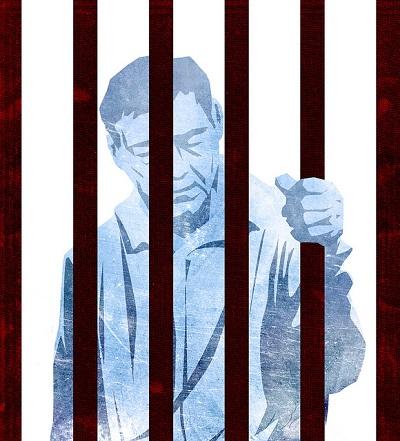Prisons Are the New Gulags for the Mentally Ill
More than ten times the number of mentally ill people are in prisons across the United States then are under treatment in mental health facilities. As of 2012, according to a new report, there were an estimated 356,000 prisoners with severe mental illness – including schizophrenia, bipolar disorder, and other acute forms of brain disease -- in prisons and jails, while state psychiatric hospitals contained approximately 35,000 patients with severe mental illness.
"[B]ecause of dramatic and sustained cuts in mental health funding, we have criminalized mental illness in this country and county jails and state prison facilities are where the majority of mental health care and treatment is administered." -- Cook County Sheriff Tom Dart.
The combination of the rise in poverty, the lack of housing, and the lack of community support for people with mental illness, has resulted in the increased criminalization of the mentally ill.
In the twenty-first century, jails and prisons have become the new gulag for the mentally ill.
"Most of the mentally ill individuals in prisons and jails would have been treated in state psychiatric hospitals in the years before the deinstitutionalization movement led to closing the hospitals, a trend that continues even today," states the Executive Summary of a new joint report from the Arlington, Virginia-based Treatment Advocacy Center and the National Sheriff's Association, titled "The Treatment of Persons with Mental Illness in Prisons and Jails: A State Survey". The organizations called their study, which surveyed sheriffs, police chiefs, and other corrections officials, the first national study of how mentally ill people receive treatment.
"Prison and jail officials are being asked to assume responsibility for the nation's most seriously mentally ill individuals, despite the fact that the officials did not sign up to do this job; are not trained to do it; face severe legal restrictions in their ability to provide treatment for such individuals; and yet are held responsible when things go wrong, as they inevitably do under such circumstances," the study said.
Mother Jones' Stephanie Mencimer recently pointed out that "Mentally ill inmates are more likely to become the victims of sexual assault and abuse. They're also overrepresented in solitary confinement, and they are much more likely than other prisoners to commit suicide."
The report found that, in 44 of our 50 states, the largest institution housing people with severe psychiatric disease is a prison or jail.
In California, "more than 33,000 mentally ill inmates, accounting for more than a quarter of the population of 120,000 in California's major prisons. [while] California's five state psychiatric hospitals combined now serve fewer than 6,000 patients," the Associated Press recently reported.
Recently, U.S. District Judge Lawrence Karlton of Sacramento "ruled that excessive use of force and isolation of mentally ill inmates continues, violating their constitutional rights against cruel and unusual punishment. In his ruling, the judge said that has led to the potential for more severe psychosis and even suicide," AP pointed out. "Unfortunately, in California, we have turned the prisons into mental health institutions," Karlton said.
There are two parts to this story: the efficacy of the report's numbers, which most experts appear to agree on; and, TAC's controversial advocacy for the forced treatment and medication of the mentally ill, which many say is ill-advised.
The Treatment Advocacy Center bills itself as "a national nonprofit organization dedicated exclusively to eliminating barriers to the timely and effective treatment of severe mental illness. The organization promotes laws, policies and practices for the delivery of psychiatric care and supports the development of innovative treatments for and research into the causes of severe and persistent psychiatric illnesses, such as schizophrenia and bipolar disorder."
The work of the Treatment Advocacy Center is not with out its critics. Many longtime advocates for the mentally ill believe that TAC is pushing involuntary outpatient treatment and forced drugging in prisons, at the expense of the civil rights of the mentally ill.
"The Treatment Advocacy Center has single-mindedly made its mission to push involuntary treatment of people with mental illness rather than focusing on the expansion of services and supports that are necessary to address the problem," a longtime advocate for the mentally ill told me. "They have done so without regard to the rights of people with mental illness and frequently use scare tactics and a blatant disregard for the facts. The Treatment Advocacy Center's scare tactics exaggerate the links between mental illness and violence."
TAC's work may in fact be adding to the stigma and discrimination that the mentally ill are facing. It labels mentally ill people as violent, increases the stigma against them, which results in more of them being locked up.
According to one mental health advocate, TAC is known for jumping on violent incidents, which gins up fear amongst the public regarding the mentally ill. It is that fear that allows homeless people to be rounded up and jailed, or worse, to be shot and killed by police officials; witness the murder of a homeless man in the hills outside Albuquerque, New Mexico, last week.
On his blog, Pete Earley, a best-selling author and longtime reporter, who recognized that TAC's work is often viewed as controversial, noted: "Whether or not TAC's new report will prompt reform remains to be seen, but I'm glad that its studies are continuing to call attention to what is a national embarrassment and scandal."
Within the mental heath community, there is agreement that more outpatient and community services are needed to treat the mentally ill. In this political climate, however, is it doubtful that the needed resources will; be forthcoming. There are disagreements, however, about such issues as forced medication in prisons, a tool that can easily lead to abuse. One thing is abundantly clear: more incarceration will not address this growing problem.
BILL BERKOWITZ FOR BUZZFLASH AT TRUTHOUT

